| Etsy: Your place to buy & sell all things handmade midnightskyfibers.etsy.com |
Friday, August 17, 2007
Etsy Fun
Midnightsky Fibers Blog - Etsy Fun
Tuesday, August 14, 2007
Butler

"If gender is a construction, must there be an "I" or "we" who enacts or preforms that construction?" Judith Butler, Bodies that Matter, p 7
Butler is one of the “big” people to discuss HOS and the idea of discourse really, really critically (and there have been TONS of back and forth with her and other authors on the subject)- she talks about discourses creating sex/gender/sexuality etc. as a performance. You are both, "subjected to gender, but subjectivated by gender" (Butler, p 7) by the creations that "we" have set up to define what gender is to "us". Our creation of ourselves is in relation to what we are and what we are not- we can not have black without white, male without female- and that is the problem! We set up these creations of opposites and binaries and do not explore the possibilities beneath what these binaries mean. (See genderqueer)
Then, so following, sexuality is performative, much in the same way that what can be popular culture would be considered performative and is based on what the regimes deside the frameworks are [for culture and media, what is cool- ie coolhunting, etc]).
This awesome Judith Butler card which looks like a playing card (hey I was discussing binaries here and it fits!) was found at: http://www.theorycards.org.uk/card02.gif
M.F
"Discipline makes individuals; it is the specific technique of a power that regards individuals as objects [subjects] and as insturments [subjected] of its exercise. It is not a triumphant power..it is modest..which functions as permanent economy"
Foucault, The Means of Correct Training p 170
The subject or individual of the discourse happening is also being SUBJECTED to discourse and is produced within the discourse- the subject couldn’t exist without the discourse to support it. In this way, power is both a positive and negative. But never just one or the other. For example, when we look at ads, movies, porn, magazines, books, etc we often will blame the maker of these for the sexually explicit (etc) messages in them, but that is ignoring the fact that WE HAVE TO BE TRAINED TO RECOGNIZE WHAT THEY ARE, and more importantly, why they are sexual/wrong/right/moral/not moral, etc. It is through this power (created as the individual) that we can create the discourse that is positive and negative at the same time.
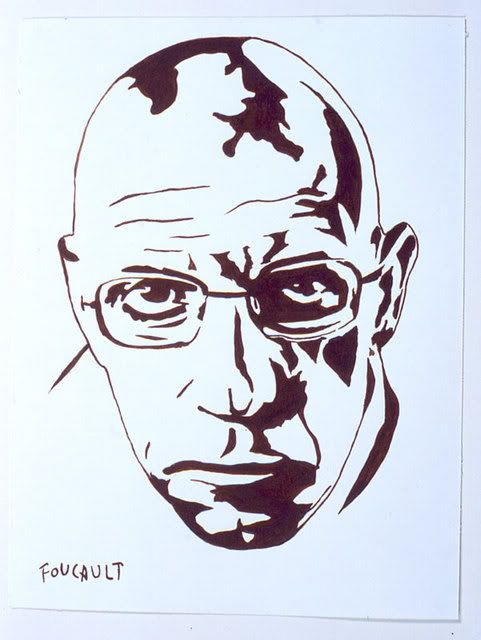
from: http://lamar.colostate.edu/~jcarlyon/head-foucault.jpg
Foucault, The Means of Correct Training p 170
The subject or individual of the discourse happening is also being SUBJECTED to discourse and is produced within the discourse- the subject couldn’t exist without the discourse to support it. In this way, power is both a positive and negative. But never just one or the other. For example, when we look at ads, movies, porn, magazines, books, etc we often will blame the maker of these for the sexually explicit (etc) messages in them, but that is ignoring the fact that WE HAVE TO BE TRAINED TO RECOGNIZE WHAT THEY ARE, and more importantly, why they are sexual/wrong/right/moral/not moral, etc. It is through this power (created as the individual) that we can create the discourse that is positive and negative at the same time.

from: http://lamar.colostate.edu/~jcarlyon/head-foucault.jpg
True Self and amputees
The creation of the true self by amputees is almost a paradox. What they are before amputees is not any less TRUE per se. However, the creation of what is the real self then changes what the true self is or needs to be. An amputee doesn't feel right in their original true self, so the amputation provides them with a new, true identity.

Image from: http://www.pharmaceutical-technology.com/projects/kondirolli/images/2-pills.jpg
Likewise, for antidepressants (which change brain chemistry), the drugs make some of the people feel "like their true self" and others much more like zombies or not themselves at all. The true self here is not than necessarily produced by medical science, but the desire to control or not control the brain. Especially with pills to "control" a person or "even them out", the issue of where and how it is ok for medical science to intervene becomes fuzzy. Do the people really want to be altered, and why do they feel like it takes the pills to make them feel real?
"In each case, the true self is the one produced by the medical science" (Amputees by Choice; p 111)

from:
http://www.pigpills.com/PigPillsBkCvr.jpg

Image from: http://www.pharmaceutical-technology.com/projects/kondirolli/images/2-pills.jpg
Likewise, for antidepressants (which change brain chemistry), the drugs make some of the people feel "like their true self" and others much more like zombies or not themselves at all. The true self here is not than necessarily produced by medical science, but the desire to control or not control the brain. Especially with pills to "control" a person or "even them out", the issue of where and how it is ok for medical science to intervene becomes fuzzy. Do the people really want to be altered, and why do they feel like it takes the pills to make them feel real?
"In each case, the true self is the one produced by the medical science" (Amputees by Choice; p 111)

from:
http://www.pigpills.com/PigPillsBkCvr.jpg
Gender Queer

Photo Source: MushyCat
The idea of gender queerness- that is, the lack of gender or a gender different from the male-female binary is an interesting phenomenon in how we have changed to read gender. Gender is not what people feel they are any longer, we must have the physical representation to match. As wikipedia kindly editorializes, "is someone who identifies as a gender other than "man" or "woman," or someone who identifies as neither, both, or some combination thereof. In relation to the gender binary (the view that there are only two genders), genderqueer people generally identify as more "both/and" or "neither/nor," rather than "either/or." (Genderqueer definition) Now, gender and sex both have to be "real", and gender becomes the performative act physically as well as the mental. The ability to be able to "read" a gender is an important aspect in much of society today, which is what throws people off so much about even the barest of discussions about genderqueer.
In Gender is Burning, Bodies that Matter, being able to read means, "taking someone down, exposing what fails to work at the level of the appearance...for a performance to work it means that a reading is no longer possible" (p 129, Gender is Burning). This artifact of "real" gender is what is used (appropriated may be a better word for it) in the creation of an equally real opposite but equally real and just an valid gender. Genderqueer takes the binary of male and female and turns it on its head, saying that whatever way people can be read, the performance of the gender is a moot point because they are breaking the binary, even if they have to recognize that the binary is there in the first place.
Gender, Race, and Nation
"The history of classification must be read in this fashion; the attention paid by scientists to human [sic] anatomy cannot be painted on a separate canvas as if it were aberrant or odd and happening within the otherwise pure and noble history of biology"
Anne Fausto-Sterling, Deviant Bodies: Gender, Race, and Nation p 24
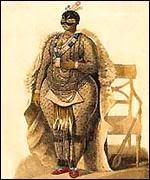
Photo Source: BBC
Bartmann, of "Hottentot" notoriety is indicative of the display and study that we subject people to in the name of "science". Attempts to define what is real is still a much contested issue.
Chiefly, the construction of the "real" creates a concept of what the body of a humyn is supposed to look like, genetically and in terms of social standards. The explorers of the 16th century are really quite like the explorers of today. Now, instead of traveling around the world, scientists trace DNA, our genes, our behaviors, all in an attempt to understand what it is that makes people different from one another. More importantly, it is an attempt to see how the other is different from ourselves. After all, you can't have black without white.
Anne Fausto-Sterling, Deviant Bodies: Gender, Race, and Nation p 24

Photo Source: BBC
Bartmann, of "Hottentot" notoriety is indicative of the display and study that we subject people to in the name of "science". Attempts to define what is real is still a much contested issue.
Chiefly, the construction of the "real" creates a concept of what the body of a humyn is supposed to look like, genetically and in terms of social standards. The explorers of the 16th century are really quite like the explorers of today. Now, instead of traveling around the world, scientists trace DNA, our genes, our behaviors, all in an attempt to understand what it is that makes people different from one another. More importantly, it is an attempt to see how the other is different from ourselves. After all, you can't have black without white.
Monday, August 13, 2007
Anorexia
Anorexia as a protest to control the body- to resist, protest, retreat, and separate the person from society, is often an attempt by a person to fit in to society. To be as thin or thinner and as beautiful or more so than the people they see on TV. The constant pressure of the mass media certainly does not help the situation, the popular culture not being one to dissuade the negative aspects of anorexia. This attempt to create the rationality, to be able to look at their bodies not only as the objects they are told to on TV and in the magazines, but as an object that is theirs to control, an expression of themselves that they can control. It is the very control that they crave , and what they cannot have that sets up the constant struggle with anorexia. The anorexia itself ends up reproducing the very problem they are trying to solve, by transforming the problem, spiraling it out of control.
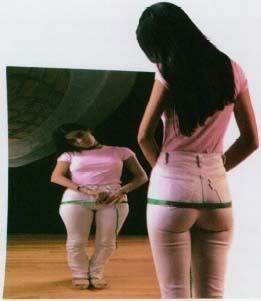
Photo Source: Human Illness: ANorexia [sic]
"The pathologies of female protest function...reproducing rather than transforming...that which is to be protested" (Bordo, Susan; Unbearable Weight p 177)

Photo Source: Human Illness: ANorexia [sic]
"The pathologies of female protest function...reproducing rather than transforming...that which is to be protested" (Bordo, Susan; Unbearable Weight p 177)
men and sensitivity
"...In all likelihood, these photographs fascinated men even more, with an exhibition of muscularity that sustained many fantasies..." (Who is the Perfect Man? Eugene Sandow and a new Standard for America, p 76)
The image of the ideal man- muscular, physical prowess unseen in the majority of the population, and the confidence in the ability of the men to do their tasks- lifting heavy objects, posing, bodybuilding, has changed greatly over time. While the image of health has remained largely a universal truth in what people look for when they look for the ideal man, the specifics of what people see as ideal changes widely across nationality, time, class, and gender. What it is to be ideal has changed now as well- to be the ideal man it is no longer enough to be just the perfect protector, but also sensitive and emotional- a reflection of which is still not widely shared or discussed amongst (as many) men in the population. The ability to present oneself as physically "real" in perfection is probably more important to the men than the womyn, as the quote points out, because they are the ones trying to meet that ideal that they construct for themselves (womyn actually have much less to do with the construction).
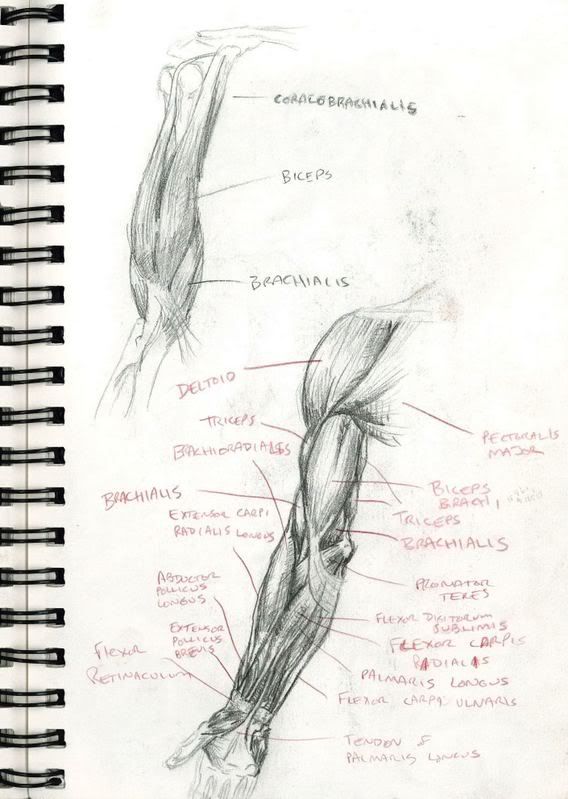
Photo Source: Caveat Emptor
Interestingly, the photo here goes along with a short descriptive story, an excert of it is below, so you can see how well it ties in with the idea of masculinity:
"He is a muscular man, sweaty and grimy. He looks exhausted and injured. The tatters of his shirt hang loosely from his shoulders. His tan cargo pants are torn and blood-stained on the front of the leg, revealing a large gash on the muscular thigh underneath. He has numerous cuts, bruises and abrasions on his torso and face, but not so many as to obscure his rugged good looks. He slings the gunbelt that's draped across his shoulder onto the couch and starts to shed clothes as he heads for the bath."- Caveat Emptor
The image of the ideal man- muscular, physical prowess unseen in the majority of the population, and the confidence in the ability of the men to do their tasks- lifting heavy objects, posing, bodybuilding, has changed greatly over time. While the image of health has remained largely a universal truth in what people look for when they look for the ideal man, the specifics of what people see as ideal changes widely across nationality, time, class, and gender. What it is to be ideal has changed now as well- to be the ideal man it is no longer enough to be just the perfect protector, but also sensitive and emotional- a reflection of which is still not widely shared or discussed amongst (as many) men in the population. The ability to present oneself as physically "real" in perfection is probably more important to the men than the womyn, as the quote points out, because they are the ones trying to meet that ideal that they construct for themselves (womyn actually have much less to do with the construction).

Photo Source: Caveat Emptor
Interestingly, the photo here goes along with a short descriptive story, an excert of it is below, so you can see how well it ties in with the idea of masculinity:
"He is a muscular man, sweaty and grimy. He looks exhausted and injured. The tatters of his shirt hang loosely from his shoulders. His tan cargo pants are torn and blood-stained on the front of the leg, revealing a large gash on the muscular thigh underneath. He has numerous cuts, bruises and abrasions on his torso and face, but not so many as to obscure his rugged good looks. He slings the gunbelt that's draped across his shoulder onto the couch and starts to shed clothes as he heads for the bath."- Caveat Emptor
Sunday, August 12, 2007
Butler dos
To go back really quickly to Foucault, the construction of power becomes important in how Butler wants to discuss gender/sex/sexuality:
"In this sense, the matrix of gender relations is prior to the emergence of the "human" [sic]" Butler, Bodies that Matter, p 7
TO bring it back to Foucalt and discourse, we cannot create the gender relations without first creating the genders to have the relations. Again, it is all through what is NOT said about and through the discourse. What is not said is especially important and serves to make the gender roles and expectations even stronger in society. Discourse again, is: (paraphrased from my notes from this class and another class where we discussed discourse)
• Discourse is closely tied to power and knowledge (think of it as a triangle with truth- so power-knowledge-truth). Discourse is what makes (constructs) a topic. In this case, gender is preformative, as is sex (because we see it as the opposite)
• Power and knowledge are created through a discourse of economy- knowledge doesn’t need to be true, it needs to be able to be passed off as true, creating and created by power. In mass media, we are creating what is popular through our conversations, and the same is very much true for gender and sex.

Photo from: http://art.transindex.ro/images/__leo/hetikep/kepeslap/kepeslap_596.jpg
"In this sense, the matrix of gender relations is prior to the emergence of the "human" [sic]" Butler, Bodies that Matter, p 7
TO bring it back to Foucalt and discourse, we cannot create the gender relations without first creating the genders to have the relations. Again, it is all through what is NOT said about and through the discourse. What is not said is especially important and serves to make the gender roles and expectations even stronger in society. Discourse again, is: (paraphrased from my notes from this class and another class where we discussed discourse)
• Discourse is closely tied to power and knowledge (think of it as a triangle with truth- so power-knowledge-truth). Discourse is what makes (constructs) a topic. In this case, gender is preformative, as is sex (because we see it as the opposite)
• Power and knowledge are created through a discourse of economy- knowledge doesn’t need to be true, it needs to be able to be passed off as true, creating and created by power. In mass media, we are creating what is popular through our conversations, and the same is very much true for gender and sex.

Photo from: http://art.transindex.ro/images/__leo/hetikep/kepeslap/kepeslap_596.jpg
Amputee
The identity as an amputee, or a wannabe amputee poses interesting problems for the medical community, as well as society as a whole. How do you ethically chose to let someone remove or have a part of their body removed that the larger society says is necessary or helpful to their usefulness and contributions to society? In these cases, the true self can only come about through the removal medically of the limb. The feeling that something is missing or not right, that the limb does not belong to them or needs to be gone, is something that larger society often has a problem with because they have a hard time fathoming how wanting to be an amputee was NOT a physical or mental disorder. The interesting point of this is- at what lengths does society go to discourage or prevent amputees? If it is treated as a cosmetic procedure (thus denying its legitimacy as necessary), the patients usually have to pay out of pocket and would not have the same support network in place.
"Should amputation be treated like cosmetic surgery, or like an invasive psychiatric treatment, or like a risky research procedure?" (Amputees By Choice, p 110)
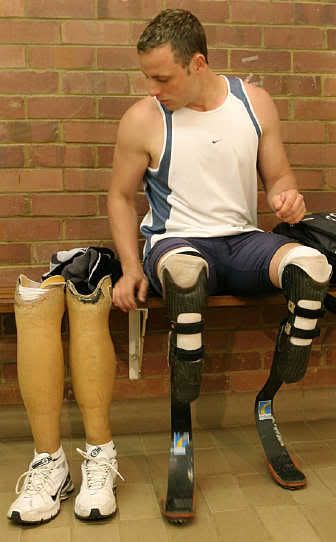
from: http://www.spokesmanreview.com/stories/2007/jul/11/spt_11_pistorius_07-11-2007_I1B0U9A.jpg
"Should amputation be treated like cosmetic surgery, or like an invasive psychiatric treatment, or like a risky research procedure?" (Amputees By Choice, p 110)

from: http://www.spokesmanreview.com/stories/2007/jul/11/spt_11_pistorius_07-11-2007_I1B0U9A.jpg
Sunday, July 29, 2007

Image from:
http://www.netflix.com/WatchNowMovie?movieid=70044071&trkid=203119
We have taken genetic men/womyn and made them "real". (quote from the movie by a doctor that was an "expert*") Ok, admittedly, that is not the first thing that comes to mind when I saw the cover of this documentary called "Let me Die a Woman" [sic]. The movie discusses the importance of being able to appear as a womyn in every sense of the word- and most importantly, for their bodies to match how they feel. The problem with the film is much like Bell Hooks's critique of Paris is Buring. The "experts" describe FTM and MTF transsexuals as subjects, discussing the physical and mental "problems" that make them feel the way they do. While the film does not mean to be offensive in its approach, the descriptions of the "how and why" people want to change leaves something to be lacking. (This movie was also a cult classic and was rereleased).
"Any audience hoping to be entertained would not be interested in the true life and testimonials narrated. ..the cinematic narrative makes the ball the center of their lives, yet [who makes it so]?" Is Paris Buring? Bell Hooks, p 155
Much like Paris is Burning, the movie Let me Die a Woman [sic] glosses over the real lives of the people, focusing on the sensationalist views, the medical explanations, everything but the briefest looks at how people really felt. Even those were quite scripted.
*I think the idea of the expert has changed quite a bit, obviously it is constructed, but the advent of the internet makes it easier now for people to be experts in a field. Of course, this film is from 1978...
Tuesday, July 24, 2007
Subscribe to:
Posts (Atom)